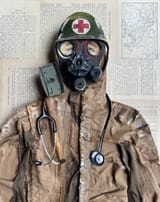Search Results
6/16/2025, 12:04:24 PM
Europe's frontier countries ready their hospitals for war
1/?
From stockpiling trauma kits for mass casualties to kitting out medics with body armor, wartime health planning is no longer hypothetical on NATO’s eastern flank.
Speeding along Fabriko Street in an ambulance toward Lietavos school, Martyna Veronika Noreikaitė felt unprepared. She could feel her heart pounding.
It was a sunny Tuesday morning in mid-May when Noreikaitė was radioed about an explosion in Jonava, a city of 30,000 people in central Lithuania.
In her three years as a paramedic, her calls would, on a normal day, involve high blood pressure or chest pains. This was Noreikaitė’s first mass casualty event.
As they pulled up to the school, sirens wailing, the building was obscured by smoke.
“People were running around, lying on the ground, screaming,” Noreikaitė said, recalling the chaos at the school’s stadium. Police, firefighters and military personnel were already on site.
Noreikaitė and her colleague were the first paramedics to arrive.“When you see what happened — the panic, the screams — you don’t know what to do, or where to go. You forget everything. It throws you off balance.”
The novelty of such a disaster in a peaceful European state was precisely why the Lithuanian authorities had set up the two-day “Iron Wolf” (“Geležinis Vilkas”) military exercises.
The goal was to steel the military, police, firefighters, hospitals and paramedics to operate under exceptional circumstances — as Lithuania braces for the worst-case scenario: an attack on NATO’s eastern flank. Since Russia’s full-scale invasion of Ukraine, the threat of military conflict has loomed large.
1/?
From stockpiling trauma kits for mass casualties to kitting out medics with body armor, wartime health planning is no longer hypothetical on NATO’s eastern flank.
Speeding along Fabriko Street in an ambulance toward Lietavos school, Martyna Veronika Noreikaitė felt unprepared. She could feel her heart pounding.
It was a sunny Tuesday morning in mid-May when Noreikaitė was radioed about an explosion in Jonava, a city of 30,000 people in central Lithuania.
In her three years as a paramedic, her calls would, on a normal day, involve high blood pressure or chest pains. This was Noreikaitė’s first mass casualty event.
As they pulled up to the school, sirens wailing, the building was obscured by smoke.
“People were running around, lying on the ground, screaming,” Noreikaitė said, recalling the chaos at the school’s stadium. Police, firefighters and military personnel were already on site.
Noreikaitė and her colleague were the first paramedics to arrive.“When you see what happened — the panic, the screams — you don’t know what to do, or where to go. You forget everything. It throws you off balance.”
The novelty of such a disaster in a peaceful European state was precisely why the Lithuanian authorities had set up the two-day “Iron Wolf” (“Geležinis Vilkas”) military exercises.
The goal was to steel the military, police, firefighters, hospitals and paramedics to operate under exceptional circumstances — as Lithuania braces for the worst-case scenario: an attack on NATO’s eastern flank. Since Russia’s full-scale invasion of Ukraine, the threat of military conflict has loomed large.
Page 1
